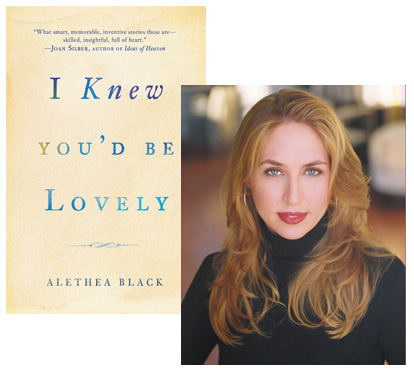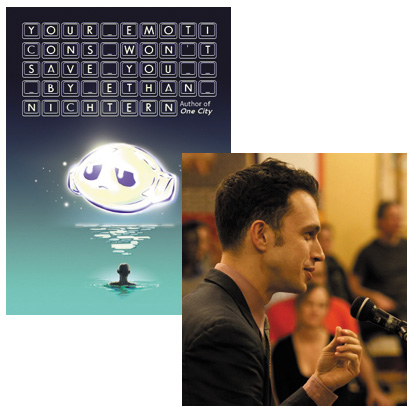How Alethea Black Fell in Love with “Natasha”

I’ve been friends with Alethea Black for a couple years now, and I’ve had the pleasure of reading some of the stories in her debut collection, I Knew You’d Be Lovely, when they were first appearing in literary magazines. In recent months, she’s been taking part in pretty awesome events, like the WordTheatre reading at Soho House that’s coming up on March 4, 2012, where one of her stories will be read by Maggie Siff (of TV’s Mad Men and Sons of Anarchy). In this guest essay, Alethea talks about a David Bezmozgis short story that showed her on just how many levels great fiction can move us.
At Thanksgiving in 1994, my sister Ashley gave me an orange paperback volume of The Best American Short Stories, edited that year by Tobias Wolff; she didn’t know that she was changing my life. Unlike the staid, obligatory short stories I’d been assigned in high school, these contemporary tales struck me as often funny and fresh and always absurdly, fiercely true. Before that, I’d had little exposure to writing that was simultaneously playful and profound, as eloquent as it was informal. It was like discovering a bootleg Bible that was full of jokes. And it made me want to be a writer.
I spent the following ten years reading and studying contemporary short stories, in pursuit of a sort of home-school MFA—although I don’t think I realized that’s what I was doing at the time. A decade after my Best American initiation, Michael Chabon’s introduction to the 2005 volume expressed what I’d learned. “Entertainment has a bad name. Serious people, some of whom write short stories, learn to mistrust and even to revile it. The word wears spandex, pasties, a leisure suit studded with blinking lights… Entertainment, in short… is bad for you—bad for your heart, your arteries, your mind, your soul.†He goes on to say—in a wildly amusing way—that the problem lies not in stories that amuse, but in our impoverished respect for the power of amusement. When I read that introduction, I was still two years away from publishing my first short story, and six years away from publishing my first book. But Chabon’s words became a call that I would try to answer in my own work.
The stories in Chabon’s edition of Best American bend lithely beneath the limbo bar of his introduction, and include some miraculous feats of entertainment: Tom Bissell’s “Death Defier,†Joy Williams’s “The Girls,†George Saunders’s “Bohemians.†But the story that inspired me most is David Bezmozgis’s “Natasha,†about a young Soviet Jewish immigrant’s first experiences with sex and betrayal. I love its energy (opening line: “When I was sixteen, I was high most of the timeâ€); its easy yet inventive voice (“I thought it had to do with the forbidden. The attraction to the forbidden in the forbidden. The forbiddenestâ€); and its humor (“She dropped down into one of the two velour beanbag chairs in front of the television. Chairs that I had been earnestly and consistently humping since the age of twelveâ€). I love the way it makes its own rules—Bezmozgis introduces his characters’ speech with em-dashes, forgoing quotation marks and dialog tags—and fearlessly encompasses masturbation, pornography, Nietzsche, Bob Marley, the Israeli–Palestinian conflict, Led Zeppelin, and Bizet’s Carmen. I love that it has a character named Rufus.
Any fan of screwball comedies or Alfred Hitchcock thrillers knows that just because something is exhilarating and enjoyable doesn’t mean it can’t also be edifying and true. What’s more entertaining than flat-out, buck-naked genius? Kafka described a book as an axe for the frozen sea within, and Chabon names the breaking pleasure. “Because when the axe bites the ice, you feel an answering throb of delight all the way from your hands to your shoulders, and the blade tolls like a bell for miles.†In my forty-two years on the planet, I’ve yet to find anything with a greater capacity to curl my toes and widen my mind and upend my heart than a perfectly-hewn short story. Then again, maybe I don’t get out enough.
2 March 2012 | selling shorts |
Ethan Nichtern: Poets Are Better Than Poetry

When I got a look at Ethan Nichtern‘s “short novel with poetry” Your Emoticons Won’t Save You, I was intrigued by the notion of writing poems from the perspective of the novel’s main character, so I approached Ethan and asked if he’d be interested in doing a guest essay for Beatrice. He takes a very personal approach to that topic, one that touches upon his own introduction to poetry as a child, and the personal connections he’s made with it as he’s gotten older.
Confession: I like poets more than I like poetry. Always have. My first formal poetry lesson came from Allen Ginsberg, when I was about nine years old. Allen studied with the same Buddhist teacher as my parents. He invited a handful of kids from the community to his East Village apartment and led us through some writing exercises and songs. Of course I had no idea who he was, except for a sweet old dude named “Allen.” I don’t remember much of what he taught; I hadn’t read a word of his writing. I remember his kind demeanor, his fearlessly bad singing voice, his soft gaze of a wild uncle at his kitchen table, and the old-style overhead-chain toilet in his bathroom.
Later, in high school and college, when I actually started to fancy myself a “Wannabe” Poet, I finally read Ginsberg’s work in depth, appreciating the ways his lyrics churned, the way he painted with words, the way his thoughts effervesced out onto the page. But mostly I remembered our few interactions before his death in 1997, and his figure in his apartment, a portrait etch-a-sketched in my mind. Since then, I’ve been around my fair share of poetry and my fair share of poets, both of the written and the performance variety. Something interesting always happens to me when I encounter a poet’s work. If I know the person and know a little of what makes them tick, I find myself leaning into their language with laser-like focus. If I don’t know them, if I haven’t inhabited their life at all, I find my interest in their work waning quickly. Poets, it seems, “do it” for me much more than Poetry.
I wrote a nonfiction book on contemporary Buddhism, One City: A Declaration of Interdependence. It was published in 2007, and was well received, but I always considered poetry and fiction to be, for me, the most resonant realms for exploring all the nooks and crannies of the mind’s wisdom and the heart’s confusion.
Your Emoticons Won’t Save You follows Alex Bardo, the self professed CEO of the Wannabe Poet’s Brigade, through a nostalgic road trip back to an old summer-camp at the end of the summer of 1998, as he’s going on 21 years old. Multiple forms of loss—as well as a tragicomic sense of just plain being lost—converge on him throughout the narrative. He uses poetry, or more precisely, his ironic identity as a Wannabe Poet, to cope with the space of transition in which he lives. For him, the act of writing poetry is one part narcissistic meditation and one part savior of sanity.
For every Actual Poet I have ever met, I have met 1,000 Wannabe Poets. Wannabe Poets do it for me even more than Poets. Wannabe Poets scribble on napkins and press our pen way too hard into those 99-cent camouflage journals. We open WordPress accounts in fits of inspiration and then forget to post anything for months. Wannabe Poets compose horrible love poems when someone breaks up with us, and even more horrible poems when someone returns our text message flirtatiously. Wannabe Poets forget to write anything at all when someone we love dies. We get depressed by failure and solemnly vow to never write again, then wake up the next morning and start scribbling on the closest piece of paper we can find. Wannabe Poets are a dime a dozen (less with inflation), and we even get off a little bit on the cliche of just how ludicrously numerous we are.
Your Emoticons Won’t Save You ends with 12 poems, authored by the novel’s protagonist over the next decade of his life, as life and love and loss have seasoned him a little bit toward that overrated state called maturity.
The premise of Your Emoticons Won’t Save You follows from my early experience with poetry, beginning with sitting in Allen Ginsberg’s apartment as a nervous nine year old. The idea is that if you get to know a poet first through reading his story, you will be more likely to want to read his poetry. Or, in Alex Bardo’s case, the idea is that if the reader gets to know a Wannabe Poet, you will want to read his Wannabe Poetry.
Updated Confession: I like Poets more than I like Poetry—and I like Wannabe Poets even more.
1 March 2012 | guest authors |

 Our Endless and Proper Work is my new book with Belt Publishing about starting (and sticking to) a productive writing practice.
Our Endless and Proper Work is my new book with Belt Publishing about starting (and sticking to) a productive writing practice. 
